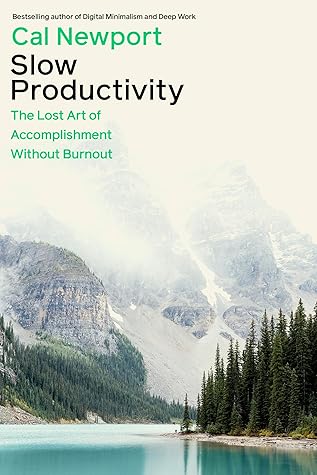More on this book
Community
Kindle Notes & Highlights
by
Cal Newport
Read between
March 13 - March 18, 2024
“It doesn’t matter that something you’ve done before worked out well. Your last piece is never going to write your next one for you.”
“The productivity terminology encodes not only getting things done, but doing them at all costs.”
A philosophy for organizing knowledge work efforts in a sustainable and meaningful manner, based on the following three principles: 1. Do fewer things. 2. Work at a natural pace. 3. Obsess over quality.
this philosophy rejects busyness, seeing overload as an obstacle to producing results that matter, not a badge of pride. It also posits that professional efforts should unfold at a more varied and humane pace, with hard periods counterbalanced by relaxation at many different timescales, and that a focus on impressive quality, not performative activity, should underpin everything.
I want to prove to you, in other words, that accomplishment without burnout not only is possible, but should be the new standard.
Sometimes, a little friction is all it takes to slow down a torrent of incoming work.
In the Nicomachean Ethics, which would have been familiar to any serious thinker from the time of Copernicus onward, Aristotle identified deep contemplation as the most human and worthy of all activities.
It’s true that many of us have bosses or clients making demands, but they don’t always dictate the details of our daily schedules—it’s often our own anxieties that play the role of the fiercest taskmaster.
Slow productivity emphatically rejects the performative rewards of unwavering urgency. There will always be more work to do. You should give your efforts the breathing room and respect required to make them part of a life well lived, not an obstacle to it.
the scientists with whom we opened this chapter leveraged the freedom of their rarefied positions to implement an up-and-down pace that more closely resembled an Agta forager than a modern office dweller.
Working with unceasing intensity is artificial and unsustainable. In the moment, it might exude a false sense of usefulness, but when continued over time, it estranges us from our fundamental nature, generates misery, and, from a strictly economic perspective, almost certainly holds us back from reaching our full capabilities.
A more natural, slower, varied pace to work is the foundation of true productivity in the long term.
A key tenet of slow productivity is that grand achievement is built on the steady accumulation of modest results over time. This path is long. Pace yourself.
No Meeting Mondays Don’t schedule appointments on Mondays.
My suggestion is to try to put aside an afternoon to escape to the movies once per month, protecting the time on your calendar well in advance so it doesn’t get snagged by a last-minute appointment.
A clever way to balance this stress is to pair each major work project with a corresponding rest project. The idea is simple: after putting aside time on your calendar for a major work project, schedule in the days or weeks immediately following it time to pursue something leisurely and unrelated to your work.


